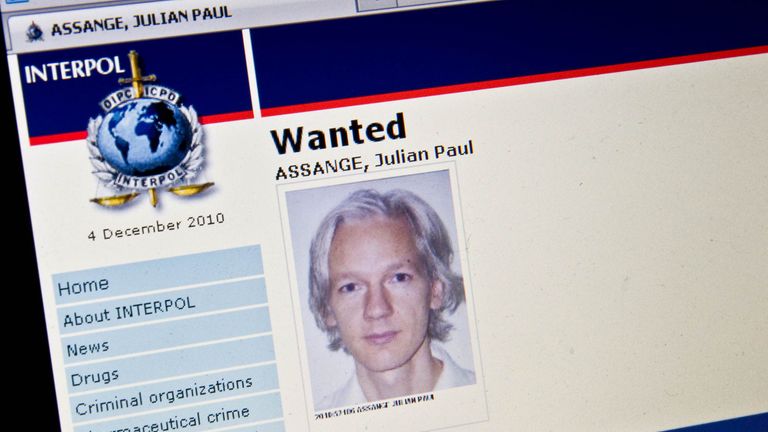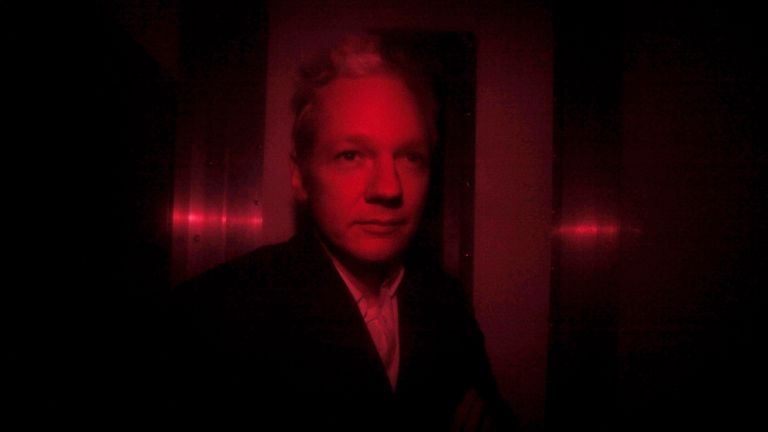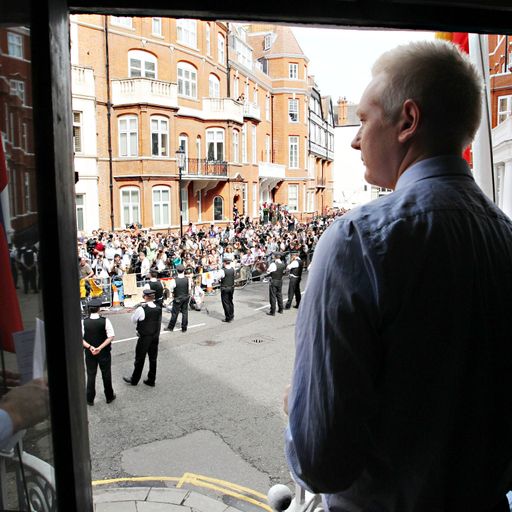Leak reveals Julian Assange plan to escape Britain and flee to Russia
Leak shows plans for the WikiLeaks founder to escape Britian and gain a visa to travel to Russia in 2010.
Monday 17 September 2018 21:50, UK
A new leak of internal WikiLeaks files reveals that Julian Assange attempted to flee Britain for Russia as authorities closed in on him.
The founder of site - which revealed secret American documents to the world - wrote to the Russian consulate in London in 2010 in the hopes of gaining a visa to the country.
"I, Julian Assange, hereby grant full authority to my friend, Israel Shamir, to both drop off and collect my passport, in order to get a visa," said the letter, which has been obtained and published by the Associated Press.
The letter was leaked to the news agency along with WikiLeaks emails, chat logs, financial records, secretly recorded footage and other documents.
On 30 November 2010, the same day as the letter is dated, Interpol issued a Red Notice seeking Assange's arrest - essentially preventing any relocation to Russia.
AP showed the documents to former WikiLeaks associates and verified non-public details such as bank accounts, telephone numbers or airline tickets to check the authenticity of the files.
Assange's relationship with Russia is of interest to America, with the FBI claiming Russia's military intelligence agency directly gave WikiLeaks stolen emails from Hillary Clinton's campaign chairman and other Democratic figures ahead of the 2016 US presidential election.
:: Assange 'invited to testify before US Congress' over Russian election interference
Attempts by Assange to avoid arrest and extradition to Sweden over allegations of sexual molestation and rape are also reportedly set out in the files. He has denied wrongdoing in the cases.
He maintains extradition to Sweden would have led to him being handed over to the Americans.
When the WikiLeaks founder turned himself in to police on 7 December, 2010, files show his staff began to work on getting him out of jail.
One WikiLeaks spreadsheet listed names of potential supporters arrayed by wealth and influence; a second one titled "Get Out of Jail Free" tracked proposed bail donations.
One document showed Guatemalan human rights lawyer Renata Avila reportedly suggested jumping bail. She has not returned messages for comment from AP.
"I will advise him to seek asylum abroad: we already contacted the Ministry of Justice in Brazil, there is a possibility to run out of the country in a Brazilian ship," Ms Avila proposed in a memo.
The document said Assange should "plan to escape and pay the bail money back to his supporters".
It is not known if, and to what extent, this proposal was realistically considered.
Assange skipped bail and has been holed up in the Ecuadorean embassy since 19 June, 2012.
The letter to the Russian consulate was reportedly drafted on 29 November, the day after WikiLeaks released the first batch of US State Department files.
It has not been confirmed when the message was actually delivered.
Mr Shamir told AP he had memory problems and cannot remember delivering the letter or whether he got the visa on Assange's behalf.
"I can't possibly exclude that it happened," Mr Shamir said in a telephone interview. "I have a very vague memory of those things."
Representatives for Assange did not return messages from AP.
Kristinn Hrafnsson, who sometimes acts as spokesman for WikiLeaks, declined to comment and labelled the revelations "rather uninteresting".
Assange has no internet access inside the embassy in London, where he continues to reside despite the sex crimes prosecution against him being dropped last year.
He says he will not leave until he receives a guarantee that he is shielded from extradition to the US.
The Russian embassy in London said it does not discuss the personal details of visa applicants.







